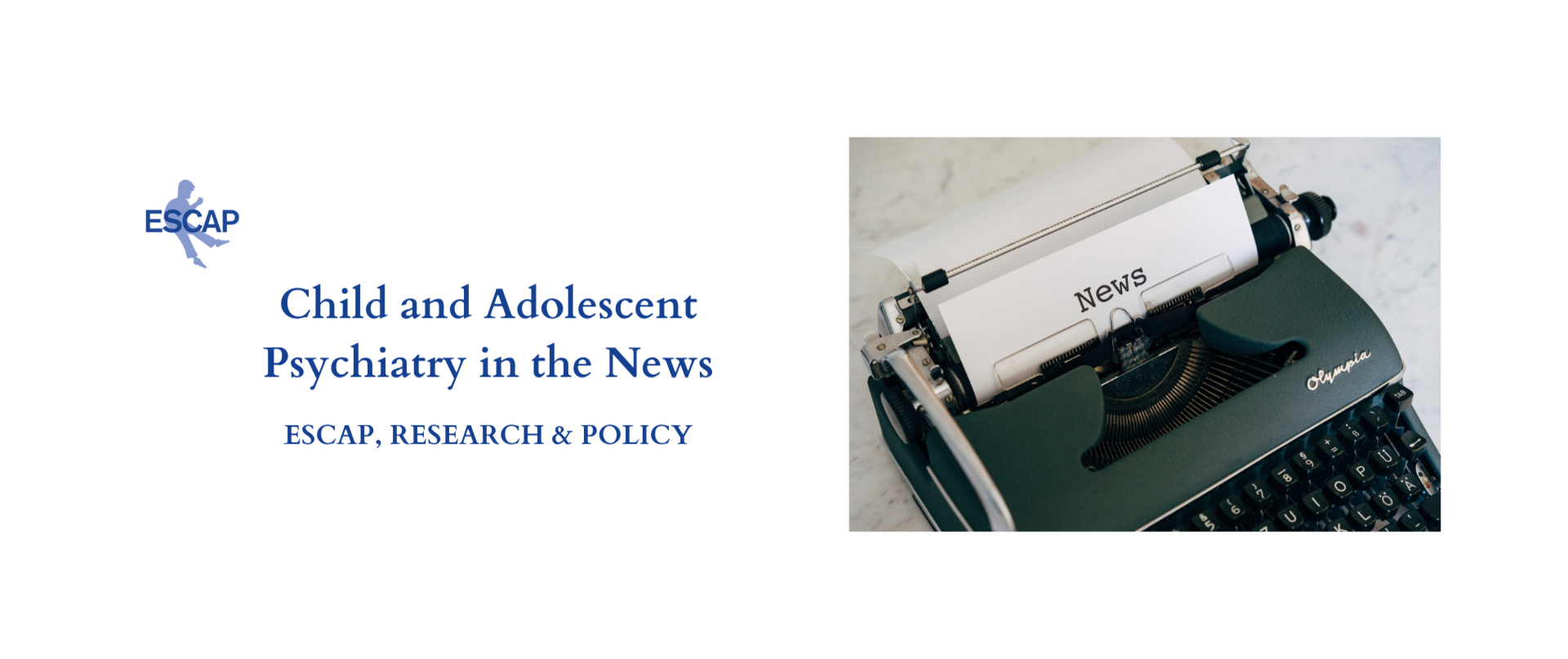
Find a selection of ESCAP and CAP news in this section. Sign up to our newsletter for monthly updates directly to your inbox and follow us on Bluesky and LinkedIn to keep up to date.
Summary: Most mental health disorders start before adulthood. They are highly prevalent, disabling and often treatable. This Series paper discusses the current problems that contribute to the growing child, adolescent and youth mental health crisis in Europe. These include the impact of the COVID-19 pandemic, escalating military conflicts, the climate crisis, and unregulated digital environments. Mental health problems in youths are further compounded by a changing landscape of how children and young people engage with the world, healthcare and other services. We outline a comprehensive list of recommendations to address mental health problems through the integration of creative prevention and treatment approaches with the help of community-based services and support systems, as well as robust research and implementation strategies to ensure cost-effective, evidence-based care.
Read the full article here
The Mental Health or Nurses and Doctors (MeND) survey, conducted by WHO Regional Office for Europe under a contribution agreement with the European Commission, aimed to explore the mental health, well-being and working conditions of doctors and nurses in the 27 European Union countries plus Iceland and Norway. The survey was disseminated from October 2024 to April 2025 across all 29 countries, obtaining 122,048 responses, of which 90,171 were valid. The findings indicated a high prevalence of mental health conditions and unsafe working conditions – including violence, extended working hours and shift work – across all studied countries. Unsafe working conditions were associated with poorer mental health; conversely, the presence of workplace supports and protective factors was associated with better mental health. Seven policy actions are listed to support Member States in prioritizing action to improve working conditions and monitor progress.
Download the report here
During large scale emergencies such as natural disasters and armed conflicts, mental health needs can increase significantly. This new report underlines that mental health needs to be included as a key part of crisis preparedness. It draws on data collected by the Ukrainian Red Cross, highlighting the significant impact of armed conflict on mental health. It also includes findings from an online survey in five European countries, which explored how people perceive their readiness for crises such as natural disasters or armed conflicts. The results show that only one in seven feels mentally prepared to face large emergencies, while many worry about them daily or weekly. Encouragingly, most are willing to play a role in supporting others, though many lack the skills or confidence to do so, and say that basic training would help. The Red Cross Red Crescent provides mental health and psychosocial support during and after emergencies, and provides training to others to do the same.
Download the report
The 5th edition of the Residential Course endorsed by ESCAP has just successfully concluded, taking place from 1st to 4th October 2025 in the inspiring setting of Catania, Italy, at a hotel overlooking the Sicilian sea. Organized annually with the support of Progetto Aita Onlus - a non-profit association that promotes inclusive activities and scientific initiatives in the field of child and adolescent mental health - the course once again offered an intensive, high-quality training experience.
Led by the scientific organizing committee - Prof. Luigi Mazzone (Rome, Italy), Prof. Samuele Cortese (Southampton, UK and Bari, Italy), and Prof. Marco Armando (Lausanne, Switzerland) - this year’s edition brought together 26 delegates from 11 countries (Croatia, Denmark, France, Ireland, Italy, Portugal, Slovenia, Sweden, Switzerland, Turkey, and the United Kingdom), including child and adolescent (neuro) psychiatrists, psychologists, and PhD students.
The course featured daily lectures on major neurodevelopmental and core mental health conditions, delivered by an internationally recognized faculty: Kerstin von Plessen (Switzerland), Carmen Morcillo (UK), Suyog Dhakras (UK), Carlos Hoyos (UK), Paul Klauser (Switzerland), Andrea Danese (UK), Mario Speranza (France), and Benedetto Vitiello (Italy). The program covered a wide range of key topics, including Autism, ADHD, Eating Disorders, Trauma, Emerging Personality Disorders, Tics, and Psychosis. In addition, dedicated sessions focused on the formulation process and psychopharmacology enriched the scientific program.
A highlight of this year’s course was the inspiring keynote lecture by Prof. Jörg Fegert, President of ESCAP, on Adverse Childhood Events, which sparked deep discussion and reflection among participants.
The planning for the next edition is already underway! For more information, please visit https://residentialcourse.com/
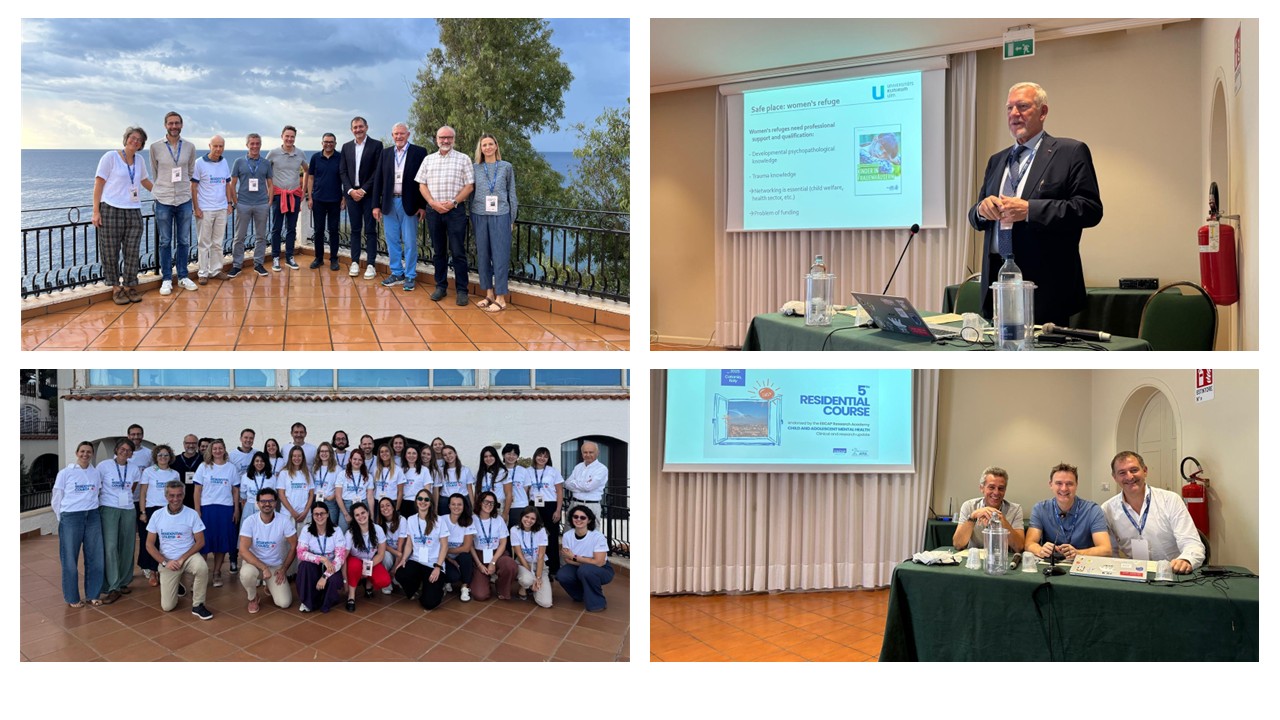
More than 1 billion people are living with mental health disorders, according to new data released by the World Health Organization (WHO), with conditions such as anxiety and depression inflicting immense human and economic tolls. While many countries have bolstered their mental health policies and programmes, greater investment and action are needed globally to scale up services to protect and promote people’s mental health.
Mental health conditions such as anxiety and depression are highly prevalent in all countries and communities, affecting people of all ages and income levels. They represent the second biggest reason for long-term disability, contributing to loss of healthy life. They drive up health-care costs for affected people and families while inflicting substantial economic losses on a global scale.
The new findings published in two reports – World mental health today and Mental Health Atlas 2024 – highlight some areas of progress while exposing significant gaps in addressing mental health conditions worldwide. The reports serve as critical tools to inform national strategies and shape global dialogue ahead of the 2025 United Nations High-Level Meeting on noncommunicable diseases and promotion of mental health and well-being, taking place in New York on 25 September 2025.
Access the reports below:
World mental health today
Mental Health Atlas 2024
The ESCAP practice guidance on autism is now also available in Bulgarian. The guidance paper was put together by Professor Joaquin Fuentes and his colleagues Dr. Amaia Hervás, from Barcelona, and Dr. Patricia Howlin, from London. The aims for this practice guidance is to disseminate information that can be adopted for use in regular clinical practice across Europe, to present clinicians and educators with evidence-based advice on core and minimum standards for good practice in the assessment and treatment of citizens with autism of all ages.
The paper is available in English, Spanish, German, French, Italian, Turkish and now also Bulgarian and can be accessed from our website.
On 14 July 2025, the Commission has published its guidelines on the protection of minors under the DSA to ensure a safe online experience for children and young people. The adoption of the guidelines marks a milestone in the Commission’s efforts to boost online safety for children and young people under the DSA. The guidelines set out a non-exhaustive list of proportionate and appropriate measures to protect children from online risks such as grooming, harmful content, problematic and addictive behaviours, as well as cyberbullying and harmful commercial practices.
Professor Maja Drobnič Radobuljac shares her thoughts on the recent 2025 ESCAP Congress. As a member of the ESCAP Board and Chair of the Policy Division, it was Maja's role to help shape the content of the conference by pointing out the important topics deemed necessary by the members of ESACP, the Policy Division and the Board, and helping to identify suitable experienced and professionally respected experts who could help us learn more about each topic.
Her task included preparing sessions on one of the important topics for the youth of today: gender incongruence, gender dysphoria, and specifically how children and adolescents with symptoms of these entities are treated in the health care system. Her appointment on this topic was a direct result of the ESCAP statement on the care for children and adolescents with gender dysphoria: an urgent need for safeguarding clinical, scientific, and ethical standards, which was published in April 2024 in our ECAP journal.
Three wonderful days with a packed scientific congress have come to an end. We would like to thank all our speakers and presenters, our delegates, sponsors and exhibitors and of course our host, the French CAP Society SFPEADA under the leadership of Congress President Carmen Schröder and SFPEADA President Bruno Falissard for contributing to the success of the event.
We look forward to seeing you in Athens in 2027
We were delighted to welcome 38 participants from across Europe to our recent stakeholder event "A Dialogue on Stigma: Research, Reality, and Response", organised in collaboration with the Re-MEND and R2D2-MH Projects. The event explored current perceptions of mental health stigma, bringing together academic experts and individuals with lived experience to examine its impact and discuss meaningful responses.
Over the course of three hours, participants engaged in expert presentations and interactive discussions on how stigma manifests today, what research reveals, and which practical actions are needed - both in science and in daily life. Key topics included the influence of stigma on care and public perception, the consequences of framing mental health in terms of personal responsibility, and the importance of inclusive language in research. The discussions also covered barriers to effective communication, the empowering role of affirmative language, and concrete strategies for fostering respectful and constructive dialogue.
The event underlined the need for continued, inclusive collaboration across research, clinical practice, and society to confront stigma at personal, professional, and systemic levels
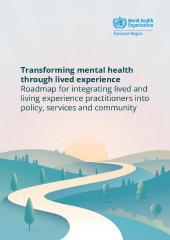
Integrating lived/living experience practitioners into health-care and social systems is crucial to realizing recovery-oriented mental health care. Practitioners model recovery and bridge gaps between traditional health-care structures and service users, humanizing and promoting inclusivity of services. This roadmap, co-created under the WHO Regional Office for Europe’s collaboration with the European Commission under the “Addressing mental health challenges in the European Union, Iceland and Norway” project, provides a structured framework to integrate lived/living experience expertise into mental health systems and workforce through six essential actions. Case studies from a variety of European countries are presented to illustrate these actions in practice. The roadmap is for use by governments, mental health policy-makers, service providers, people who use services, lived/living experience workers and advocates.
The seventh DEAPS congress was held in Sabac, a beautiful city in Sumadija and Western Serbia from 29 May to 1 June 2025. The main topic of the Congress was "Mental Health of Children and Adolescents - Trauma Within and Around Us". Several distinguished international and Serbian speakers presented the contemporary findings within the field of trauma in children and youth and yielded lively discussions with the audience after each presentation. The Congress attendees were professionals from various professions associated with children and youth mental health (psychiatrists, psychologists, pediatricians, social workers, special education and rehabilitation therapists, nurses) working in different sectors (such as healthcare, education, social welfare, and others).
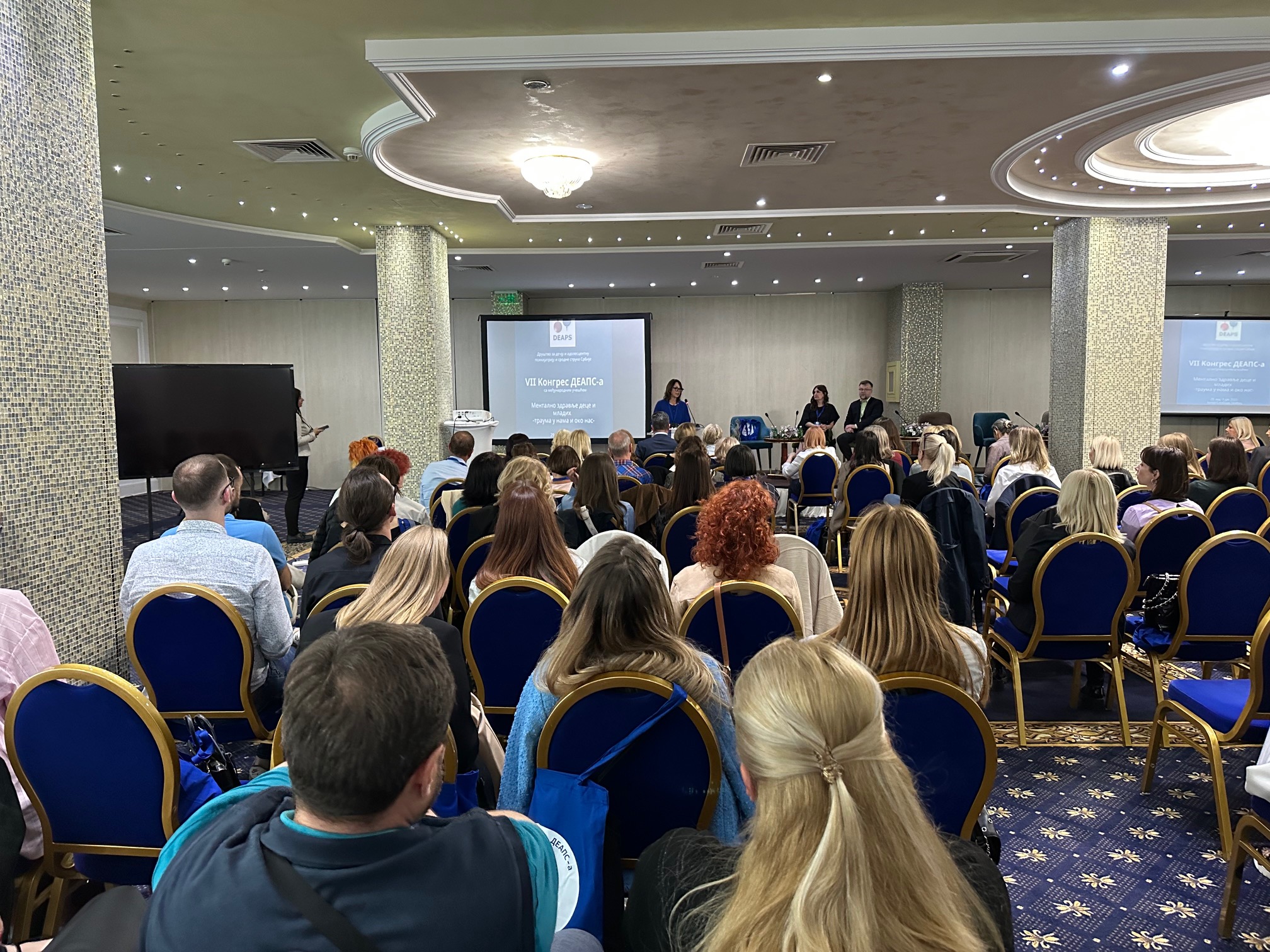
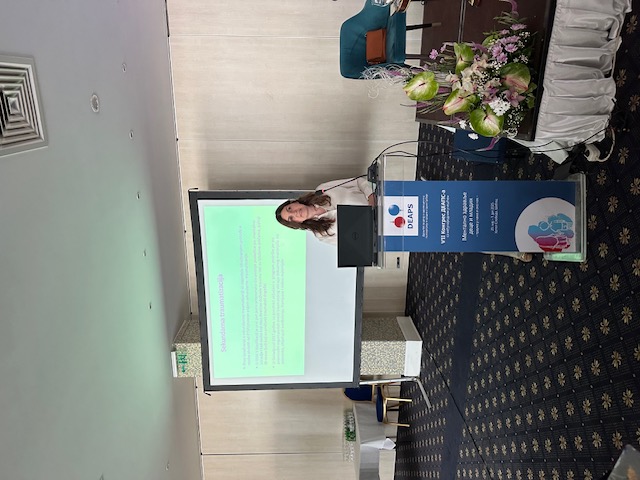
This outcome statement acts as a concise guide, encapsulating the key priorities and actions outlined during the regional high-level conference on policy innovation for mental health in all policies in the WHO European Region held in Paris, France, on 16 and 17 June 2025. Endorsement of the statement does not imply commitment from Member States, entities or represented organizations participating in the conference. Its purpose is to provide a clear and succinct overview of the conference discussions and outcomes, contributing to the advancement of policy innovation for mental health in all policies.
This policy brief aims to support countries to formulate evidence-informed policy responses to the increasing influence of digital determinants on the mental health of young people in the WHO European Region. Evidence of the impact of technology use is mixed, with studies indicating both positive and negative associations between technology use and young people’s well-being. Some online activities also have both positive and negative effects simultaneously. However, the most vulnerable young people disproportionately experience negative impacts. The relationship between technology use and mental health is bidirectional: increased screen time potentially exacerbates mental health issues, which in turn may drive further technology use. Additionally, a variety of individual and environmental factors shape young people’s digital behaviours and experiences, which change over time. Based on this evidence, the brief suggests eight priority actions for countries to promote and protect the mental health and well-being of young people in digital environments, and to mitigate the potential harms related to social media, artificial intelligence and other digital technologies.
WHO Europe will present this brief in our joint session on digital technology and mental health during out 2025 congress in Strasbourg. Join us for this panel discussion on Tuesday, 1 July from 14:15-15:45 in Room Cassin (2).
The second Lancet Commission on adolescent health and wellbeing focuses on required actions to transform adolescent health and wellbeing. It provides an evidence-based guide to act now and in the post SDG era. Building on the 2016 Lancet Commission on Adolescent Health and Wellbeing, this Commission proposes an expanded conceptual framework for actions, defines an expanded set of indicators to ensure accountable action, and presents substantial original research that supports a wide range of specific cross-sectoral actions at global, regional, country, and local level. It ultimately aims to catalyse progress in adolescent health and wellbeing in today’s rapidly changing world.
What does stigma around mental health look like today? What does research say, what are people experiencing, and how can we respond? Together we will explore the impact of stigma in both research and real-world settings. Designed with researchers in mind but open to all, it will feature thought-provoking talks from leading academics alongside conversations with people who bring lived experience to the dialogue.
What to expect:
Date: Tuesday, 10 June 2025
Time: 3 – 6 PM CEST
Free Online Meeting via Zoom
View the agenda
Register now!
The ESCAP practice guidance on autism is now also available in Turkish. The guidance paper was put together by Professor Joaquin Fuentes and his colleagues Dr. Amaia Hervás, from Barcelona, and Dr. Patricia Howlin, from London. The aims for this practice guidance is to disseminate information that can be adopted for use in regular clinical practice across Europe, to present clinicians and educators with evidence-based advice on core and minimum standards for good practice in the assessment and treatment of citizens with autism of all ages.
The paper is available in English, Spanish, German, French, Italian and now Turkish and can be accessed from our website where you will also find further information and an interview with Professor Fuentes.
ESCAP has joined Bluesky! We will be sharing news about our society, our congress as well as information relating to our specialty. In the run up to our congress, we will be posting both on our X and Bluesky account to ensure that our community receives our updates. Eventually, we will be leaving X. If you are on Bluesky, come on over and give us a follow on @escaponline.bsky.social.
The WHO Regional Office for Europe will launch their Quality Standards for Child and Youth Mental Health Care on Thursday, 27 March 2025. We are delighted that Robert Vermeiren, co-chair of our ESCAP Policy Division, will be speaking at this online event which is open to all to attend. Visit the WHO Europe website for more information and register here for the Zoom.
The WHO Quality Standards for Child and Youth Mental Health Care provide a comprehensive framework for outpatient and community settings, to define high-quality specialized mental health care and improve services. Developed with input from children, young people, caregivers and providers, and consultations across the WHO European Region - which ESCAP Board members contributed to - these standards include example quality indicators for inspiration and adaptation.
The standards can be tailored to the context of each country, forming part of a broader approach to improving health-care quality. They can be used by health workers or health leaders to self assess and prioritize areas for quality improvement, or by the general public to understand what high-quality care can look like.
The scientific programme of our 2025 ESCAP congress "Beyond nature & nurture" is now available on the congress website. We received more than 1,400 abstracts from 60 countries and would like to thank everyone for submitting their work! Use the filter options to search for the topics you are interested in and mark sessions as "favourite" to put together your personal programme. Search by "form of presentation" to for example check the timings for our Keynote and State-of-the-Art lectures.

WHO Europe have published their 2024 review of the Menta Health Flagship. The year 2024 saw the Mental Health Flagship, under the Division of Country Health Policies and Systems at the WHO Regional Office for Europe, make inroads in more sustainable and accessible mental health systems through four key areas: policy, services, data collection and stigma reduction. It marked the third year of the pan-European Mental Health Coalition and second year of the Addressing mental health challenges in the European Union (EU), Iceland and Norway project, funded by the European Union. Through these initiatives, the Flagship cemented important partnerships and built country capacity in implementing evidence-based policy, protecting the human rights of people with lived experience of mental health conditions, and supporting the mental health of health and care workers.
ESCAP is delighted to be part of the pan-European Mental Health Coalition and to have presented at both the Mental Health Week and the Autumn School on Quality of Child and Adolescent Mental Health Care last November. We look forward to continuing our collaboration in 2025.
Regina De Dominicis, UNICEF Regional Director for Europe and Central Asia, and Hans Kluge, WHO Regional Director for Europe, are calling for a renewed focus on child and adolescent health and wellbeing. The co-creation and adoption of a new regional framework for action for children and adolescents based on five key principles is being proposed. Governments, civil society, and international bodies are being called to work towards a sustainable and healthy future for all—with children and adolescents as full partners.
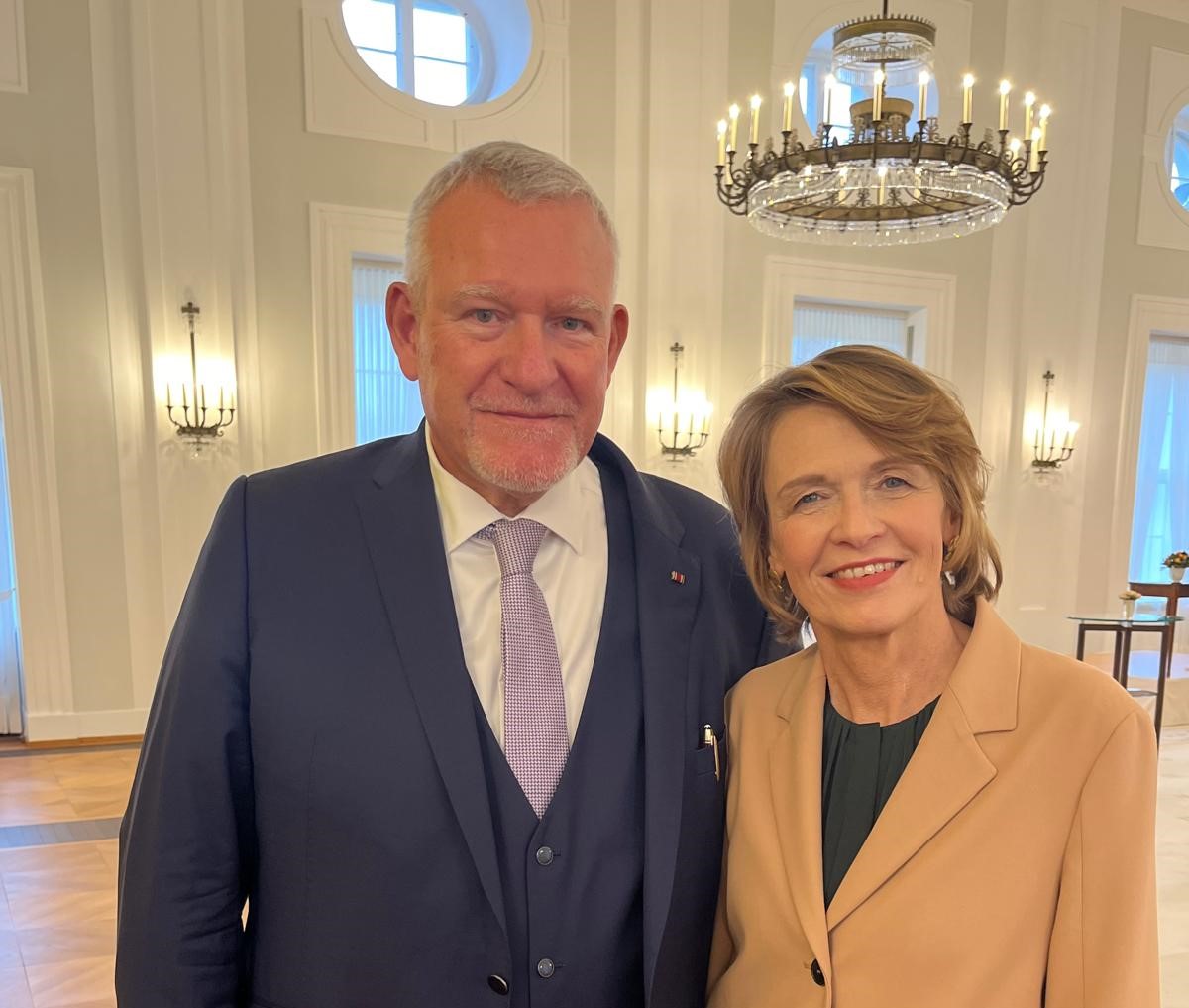
ESCAP President Jörg Fegert was invited to the New Year’s reception hosted by the German First Lady, Ms. Büdenbender, at Bellevue Castle in Berlin. In her brief review of the year, Ms Büdenbender first mentioned the conference on health support for Ukraine, of which she and Ms Selenska had been patronesses. At that event Professor Fegert had met Ms. Oksana Zbitnieva and Ms. Irina Mykychak in person for the first time. Among other things, this gave rise to the ESCAP webinar series for Ukrainian colleagues in the field of mental health, which has successfully been reaching over 400 attendees live each time.
Ms Büdenbender also spoke about the mental health problems of today's children and young people. She spoke very passionately about child protection and talked about the importance of her network of people in voluntary work.
As a special guest, she welcomed Ms. Friedländer, the 103-year-old Holocaust survivor who has made it her mission to speak as often as possible with today's young people about her survival in the concentration camp. Her energetic demeanour and her positive view on life are truly admirably and what an impressive example of post-traumatic growth. As described by Viktor Frankl, dealing with traumatic experiences and one’s inner compass, can enable people to survive and surpass themselves even after the most unbearable situations. Standing up against anti-semitism, racism and discrimination is all too topical at the moment. Ms. Friedländer is teaching us in an admirable way what a great asset human dignity is and how important it is to uphold it.
The three-year partnership – Promoting a comprehensive, prevention-oriented approach to children’s health – will help address gaps in service delivery for the most vulnerable groups and support the countries’ efforts in tackling stagnating vaccination rates, an increasing number of mental health conditions, growing obesity and increasing rates of vaping and alcohol consumption among children in 29 countries across Europe.
The collaboration will support strengthening health policies for children and adolescents through a Toolkit for Child and Adolescent Health and Mental Wellbeing Promotion that will serve as a comprehensive resource for policymakers. The partnership will focus on five aspects of children’s health: the promotion of healthy lifestyles, early childhood development and intervention, immunisation, the protection of children from aggressive promotion of harmful products including tobacco, nicotine, alcohol and unhealthy food, and the promotion of good mental health.
Our profession confronts profound challenges and complex responsibilities. Today, more than ever, we must come together to share insights, research, and experiences. The intricate interplay of biological, environmental, and cultural factors in the development of young individuals compels us to look beyond traditional paradigms of nature vs. nurture, biological vs. social psychiatry, basic vs. clinical research. The theme of our 2025 congress "Beyond Nature and Nurture" emphasizes that we need a holistic view as child and adolescent psychiatrists. With this congress we are aiming to foster a deeper understanding of these dimensions, integrating them into both clinical practice and academic inquiry.
We would like to give as many people as possible the opportunity to submit their work. As we are aware that November and December are very busy periods for most, we have decided to extend the abstract submission deadline for our "Beyond nature & nurture" congress to Sunday 12th January 2025!
Please, note that this will be the final deadline and there will not be another extension! For all information, visit the Congress Website.
The Academic Division of ESCAP is looking for two new members who will organize and coordinate the Research Academy biennial meeting. In collaboration with the ESCAP Academic Division the Research Academy (RA) advisors are responsible for the organization of the biennial meetings. Organizing ESCAP RA meetings is a fantastic opportunity to play a significant role in the training of young clinician-researchers in CAP at the European level and to coordinate international research projects through this network.
Please express your interest by emailing a cover letter and your CV to the ESCAP Communications Editor, Karen Schlaegel, on editor@escap.eu by Sunday 16 February 2025.
Registration for our 2025 congress under the theme of "Beyond nature & nurture" which takes place from 29 June to 1 July 2025 is now open! Early Bird registration closes on Friday 7 March 2025. Secure your place at the reduced registration fee now.
For all details and the online registration link, visit the Congress Website.
A century has passed since the 1924 Geneva Declaration on Children's Rights. Since then substantial progress has been made with regard to the well-being and protection of children, notably in the health and education sectors. Yet, it’s profoundly troubling that in 2024, these advances are eclipsed by the violence affecting children — a child dies every five minutes according to United Nations statistics, — and by emerging challenges such as digitization and the climate crisis.
Therefore, on 20th November a renewed Geneva Declaration on the Rights of the Child was officially unveiled by the City of Geneva and has already been signed by more than 2,500 signatories - individuals as well as organizations. ESCAP has already signed. You can visit the website and endorse the statement online. The declaration is available in 37 languages.
ESCAP President Jörg Fegert attended and presented at the "Stress & Trauma Across the Lifespan" conference which took place in the large lecture theatre of the historic Centre Universitaire Méditerranéen, which was built in 1937 directly on the Promenade des Anglais in Nice. A total of over 500 participants attended the event on site and online. The event was organised and run by Prof. Florence Askenazy, Professor of Child and Adolescent Psychiatry at the Université Cote d'Azur.

Earlier this month, the WHO Regional Office for Europe held its 3rd Mental Health Week, Meeting on Quality of Child and Adolescent Mental Health Care in Thessaloniki, Greece. The hybrid meeting brought together more than 200 key stakeholders in child and adolescent mental health care from across Greece and the rest of the WHO European Region, including young people with lived experience of mental health services, early career researchers, academics, service providers and Member State representatives. Professor Robert Vermeiren (Leiden University, The Netherlands), co-chair of the ESCAP Policy Division attended the event on behalf of ESCAP and was part of a panel discussion. Furthermore, Dr. Emmanouil Tsalamanios (General Hospital, Voula, Greece) President of our member, the Hellenic Society of Child & Adolescent Psychiatry (HSCAP), and Dr. Paraskevi Tatsiopoulou MD, MSc, PhD (Aristotle University of Thessaloniki (AUTh) & University General Hospital of Thessaloniki AHEPA, Greece) also attended and represented ESCAP at the meeting.
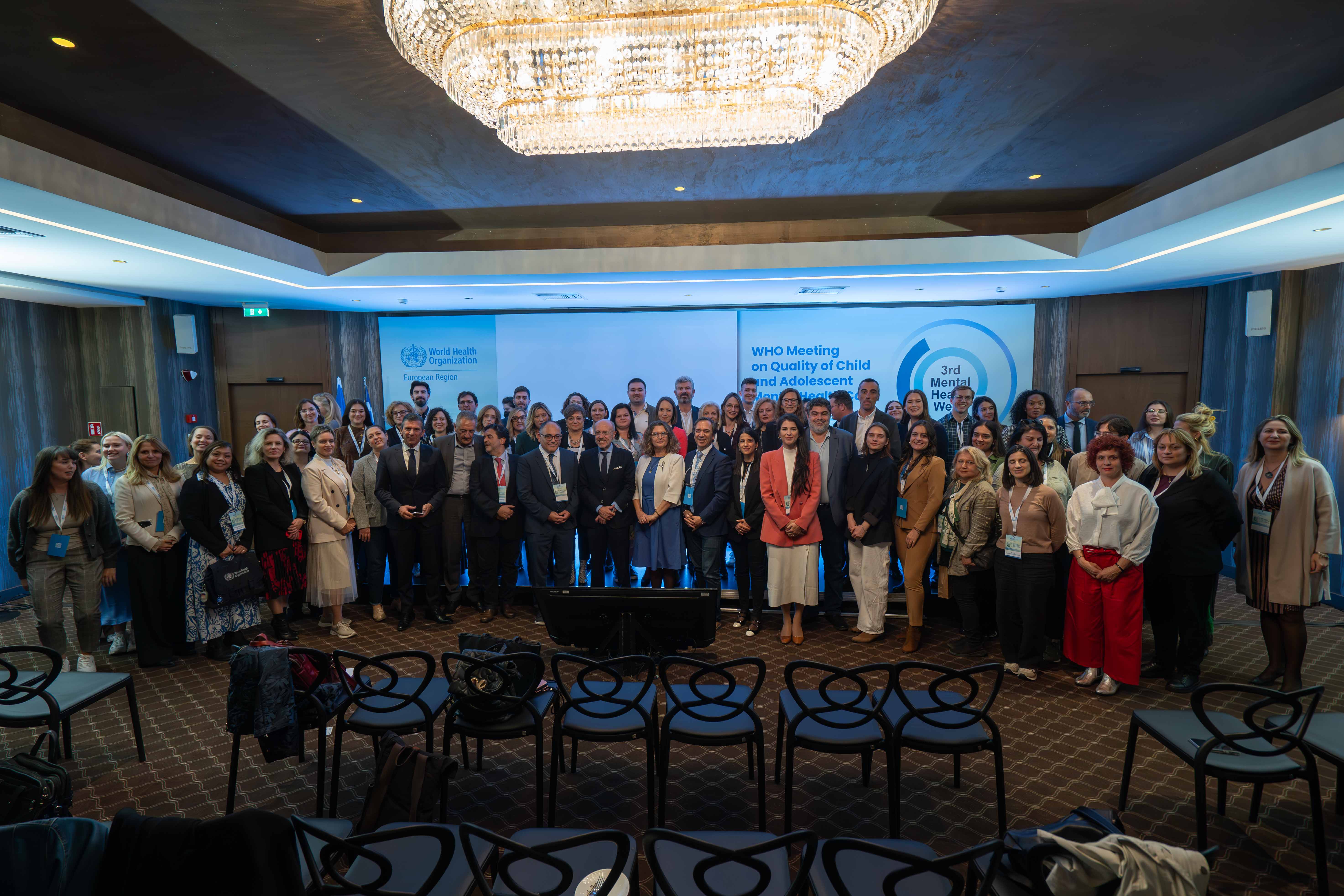
The WHO Regional Office for Europe hosted their first ever Autumn School on Quality of Child and Adolescent Mental Health Care in Thessaloniki in early November. Thirty-six participants with expertise in child and adolescent mental health from fifteen countries across the WHO European Region discussed how to define, assess and improve the quality of child and adolescent mental health. The course was designed and run by 31 experts in quality of care and child and adolescent mental health from 14 countries globally. We were delighted that Dr. Gwen Dieleman from Erasmus MC represented ESCAP at the event and presented a case study of quality improvement for child and adolescent eating disorders in The Netherlands.
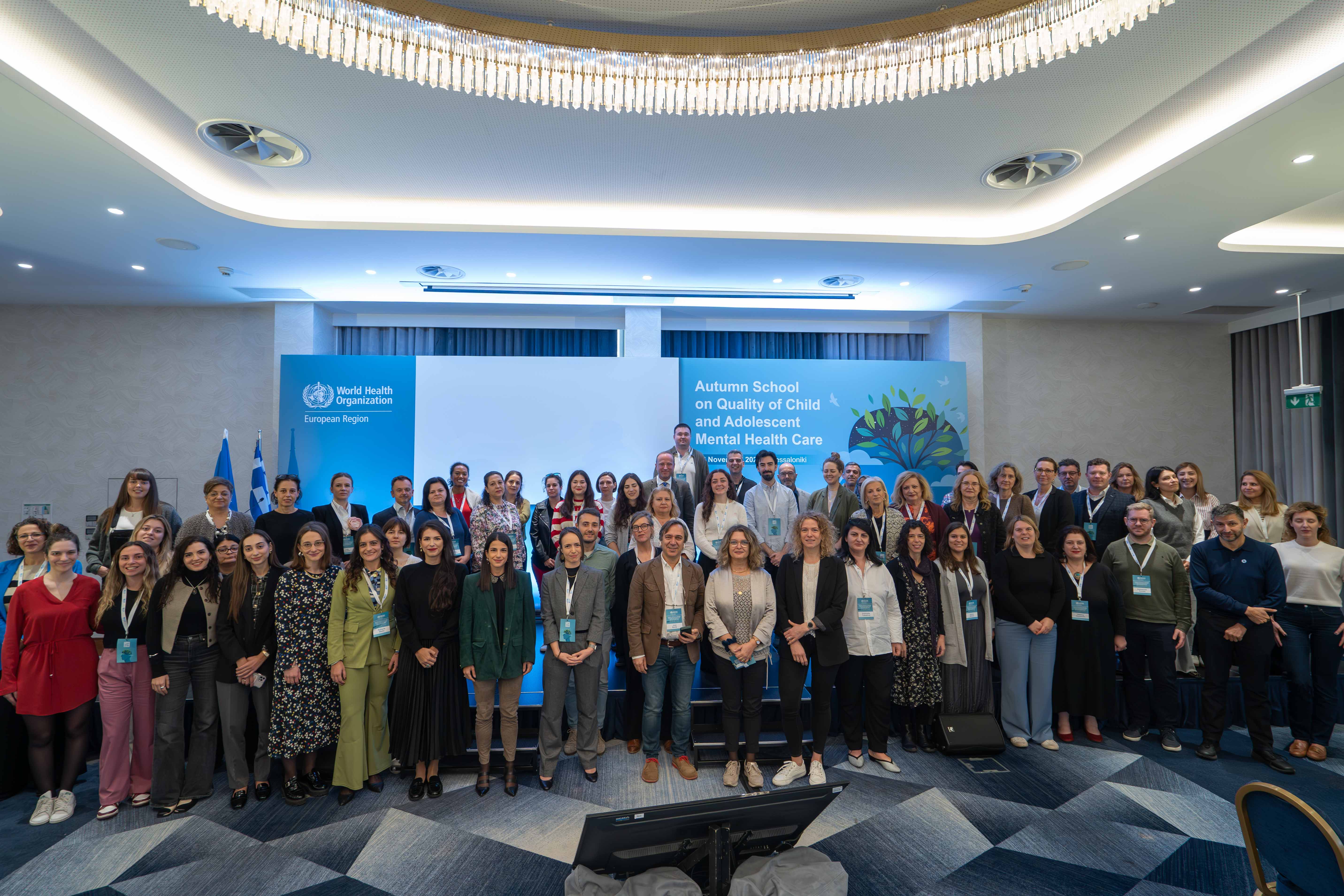
This report provides an overview of the progress made in the implementation of the Regional Digital Health Action Plan for the WHO European Region 2023–2030 since the 72nd session of the WHO Regional Committee for Europe (RC72) in 2022, from September 2022 to May 2024. The report is accompanied by a new set of illustrative actions which reflect evolving needs and latest advancements in digital health. It provides an overview of significant progress made to date across all 18 key focus areas outlined in the action plan, driving innovation, improving access to care, and strengthening health systems.
Professor Dimitris Anagnostopoulos, Past President of ESCAP, had the pleasure to attend the XXXIV conference of the Portuguese Society for Child and Adolescent Psychiatry, which took place from 24 to 25 October 2024. Dimitris opened the conference with a lecture on "The impact of today's society on the development of adolescent identity and psychopathology" and also led a pre-conference workshop on 23 October on "The impact of today's society on the development of adolescent identity and psychopathology - a discussion of clinical cases". Both the workshop and conference were well attended and covered a wide variety of topics. During his stay in Portugal, Dimitris had the opportunity to address the conference and promote the upcoming 2025 ESCAP Congress “Beyond nature & nurture” as well as other ESCAP activities on behalf of the ESCAP President and Board. Moreover, further ways to deepen the collaboration between Portuguese and European colleagues through ESCAP channels were explored. As part of his visit, Dimitris was kindly taken on a visit to one of the key outpatient mental health services – for both youths and adults - in Setubal.
The 2025 Research Academy takes place on 27-28 June 2025 in Strasbourg at the Nouvel Hôpital Civil. The theme is "The effects of psychological trauma on the brain: from mechanisms to early intervention". We are delighted to announce the confirmed speakers:
The aim of the Research Academy is to promote research excellence and collaborative work among young clinician scientists in the field of Child and Adolescent Psychiatry (CAP). ESCAP wishes to support early careers by promoting training, encouraging collaborations and by providing a forum to share experiences with senior world leading researchers.
The 2-day meeting will be chaired by Professors Paul Klauser and Alexis Revet, two clinician-scientists under the auspice of the ESCAP Academic Division. Registration for the Research Academy is free. Attendees will have to cover their own travel and accommodation expenses.
Requirements are:
How to apply:
Please submit your application via this Google Forms link before the deadline of Friday 31 January 2025. Successful applicants will be informed before the Early Bird Deadline for the ESCAP 2025 Congress closes on 7 March 2025.
The Research Academy takes place prior to the ESCAP 2025 Congress and we strongly encourage applicants to also consider submitting an abstract for presentation at the congress. Abstract submission is currently open and closes on 2nd December 2024. For all details and online submission, please visit the Congress Website.
ESCAP President Jörg Fegert spoke at the 2024 World Health Summit on a panel on "Accessible Support in Mental Health: Facing the Silent Epidemic. Empowering Communities Worldwide through Digital Content and Tools". Professor Fegert emphasized that it was crucial that we take advantage of the growing opportunities that Artificial Intelligence offered with a European perspective, but also to contribute to targeted quality development and regulate an extremely dynamically growing market of highly heterogeneous offers, not least for the benefit of patients and their families.
The full recording of the session is available on YouTube and you can read Professor Fegert's contributions here.

The ESCAP Board was generously hosted by the Societé Francaise de Psychiatrie de L'Enfant et de l'Adolescent et Disciplines Associés (SFPEADA) for their Board Meeting and the General Assembly in Strasbourg. In addition to the Board activities, the upcoming ESCAP congress Beyond nature & nurture was a focus of discussion. We will be sharing more details soon! In the meantime, visit the congress website for more information and for all details on the abstract submission which is already open!
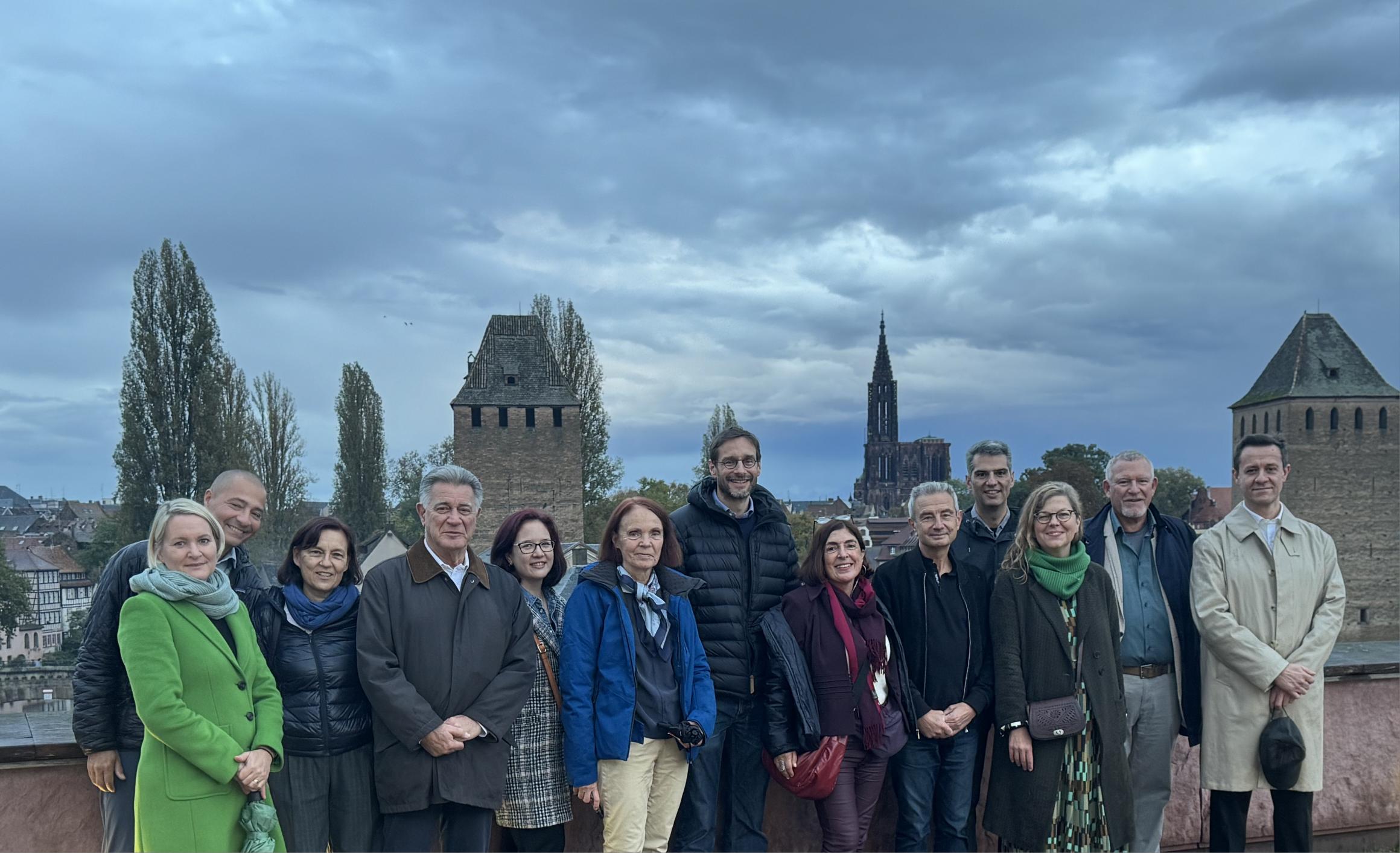
Stigma and discrimination related to mental health conditions are widespread and harmful. Reducing stigma and discrimination can benefit families, societies and economies – it can save lives. The toolkit offers practical guidance on how to achieve this, based on three core evidence-based principles: leadership or co-leadership by people with lived experience, social contact, and inclusive partnerships. These 3 principles can be realized using a four-step process: identify and define aims, plan and prepare, launch and learn and reflect and proceed. Twelve case studies from all across the world are provided to demystify the process. Stigma and discrimination can be ended if each of us acts as one using the principles in this toolkit.
The Council of Europe’s Steering Committee for Human Rights in the fields of Biomedicine and Health (CDBIO) has issued a new report on The Application of AI in healthcare and its impact on the ′patient-doctor′ relationship. The report focuses on selected human rights principles, as referred to in the ‘Oviedo Convention’, of particular relevance to the relationship, namely patient autonomy, professional standards, self-determination regarding health data, and equitable access to health care.
The report was prepared in the framework of the Council of Europe Strategic Action Plan on Human Rights and Technologies in Biomedicine (2020-2025), regarding the governance of technologies and the strategic objective of “Embedding human rights in the development of technologies which have an application in the field of biomedicine”.
The Health Behaviour in School-aged Children (HBSC) study is a large school-based survey carried out every four years in collaboration with the WHO Regional Office for Europe. HBSC data are used at national/regional and international levels to gain new insights into adolescent health and well-being, understand the social determinants of health and inform policy and practice to improve young people’s lives. The 2021/2022 HBSC survey data are accompanied by a series of volumes that summarize the key findings around specific health topics.
This report, Volume 6 in the series, focuses on adolescent social media use and gaming, using the unique HBSC evidence on adolescents aged 11, 13 and 15 years across 44 countries and regions in Europe, central Asia and Canada. It describes the status of adolescent social media use and gaming, the role of gender, age and social inequality, and changes in adolescent social media use and gaming since 2018. Findings from the 2021/2022 HBSC survey provide an important evidence benchmark for current research, intervention and policy-planning.
During the congress of the German Society for Child and Adolescent Psychiatry (DGKJP) which was held in Rostock, a joint symposium of the German and European CAP societies took place at the hashtag#DGKJP congress. These joint symposia have become a tradition: since the visit of the ESCAP Board in Berlin in 2019, joint symposia have been held at the DGKJP Congress in Magdeburg and the ESCAP Congress in Copenhagen.
20 colleagues from Ukraine and translators are attending the congress in Rostock through ESCAP contacts, thanks to the generous support of the German Society for Child and Adolescent Psychiatry, Psychosomatics and Psychotherapy. This is the second time that the DGKJP has supported the individual contacts and further education and training of colleagues from Ukraine, as the German Society for Child and Adolescent Psychiatry, Psychosomatics and Psychotherapy also generously provided scholarships for participation at the hashtag#ESCAP2023 Congress in Copenhagen.
While the Covid-19 virus is a respiratory disease, perhaps the pandemic’s biggest long-term effect on public health will be on mental health. The Ipsos Health Service Report shows a fundamental shift in attitudes to mental health compared to 2018, when we first started the Ipsos Health Service Report, and today. Six years ago, 27% chose mental health as one of the biggest health problems, putting it third, today that figure is 45% on average across 31 countries, now first. Additionally, stress is ranked third, with 31% saying it is one of the biggest issues.
The gender gap on mental health is much greater amongst young people. Fifty-five per cent of Gen Z women choose mental health as one of the biggest health problems, compared to 37% of Gen Z men. Amongst the oldest generation in this survey, the gap between men and women Baby Boomers is much smaller (27% and 26% respectively).
ESCAP held the first of a series of Webinars for healthcare professionals in Ukraine. More than 370 participants joined us online – not only child and adolescent psychiatrists, but also family doctors, paediatricians, adult psychiatrists, psychologists, social workers - a very broad, mixed field of participants. The series of webinars is organized in collaboration with the Mental Health Coordination Center of the Cabinet of Ministers of Ukraine and UNICEF. The project is being implemented within the framework of the All-Ukrainian Mental Health Programme ‘Are You OK?’, an initiative of First Lady Olena Zelenska. Presentations are simultaenously translated into Ukrainian.
We would like to thank all our speakers who are part of this important project:
The recording of this first webinar episode is now available online:
YouTube recording in English
(Please note that the introduction in the beginning is in Ukrainian, Professor Fegert's presentation starts at minute 9:15)
YouTube recording in Ukrainian
Facebook of the Cabinet Coordination Centre for Mental Health UA in Ukrainian
Just launched: Best for Us - Better access, higher quality of care and improved outcomes for children and young people with mental health problems and mental disorders
The Novo Nordisk Foundation and the Obel Family Foundation have joined with the mental healthcare services in the North Denmark Region to establish a partnership for one of the most ambitious projects related to mental healthcare services for children and adolescents. The project is called Best for Us, and the DKK 180 million allocated over a five-year period comprises the largest grant from Danish foundations targeting children and adolescents affected by mental distress or mental illness.
ESCAP President Jörg M. Fegert will be serving as one of the experts on the International Advisory Board. The overall objective of Best for Us is to develop and implement an improved regionally anchored family centered stepped-care model that ensures faster assessment and more and better treatment in time for children and young people with mental health problems and mental disorders. The vision is that the entire project will lead to better access to higher quality treatment with greater effectiveness of the offered treatment on the mental health and daily functioning of children and young people.
Co-creation with children, young people, their parents, and professionals across general practice, municipal services, and child and adolescent mental health services (CAMHS) is a fundamental principle in Best for Us.
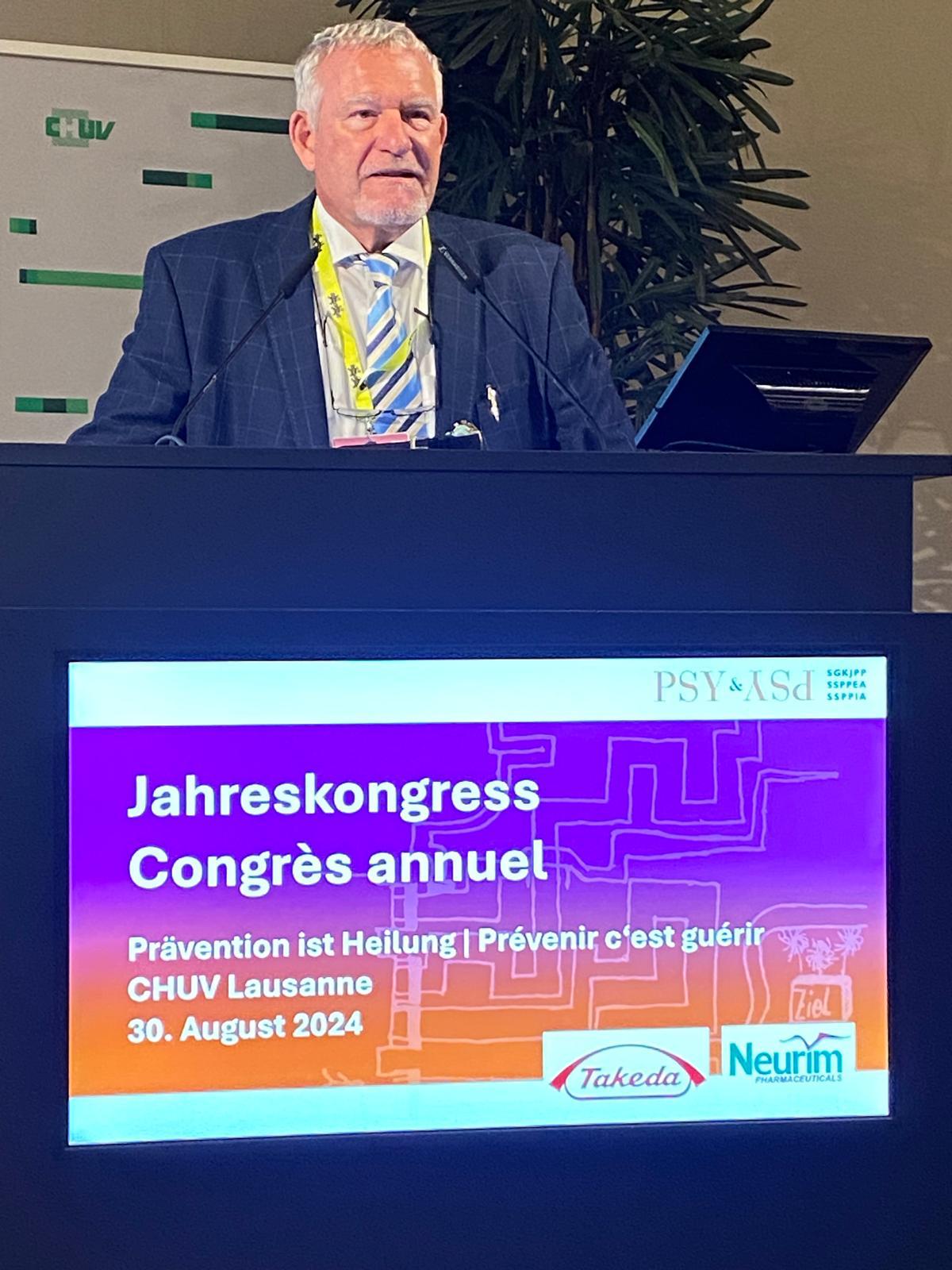
The Swiss Child and Adolescent Psychiatry society held their congress in Lausanne with more than 550 participants. ESCAP President Jörg M. Fegert gave one of the keynote lectures on "Prevention means healing: Selective and indicated prevention by adverse childhood experiences (ACE)".
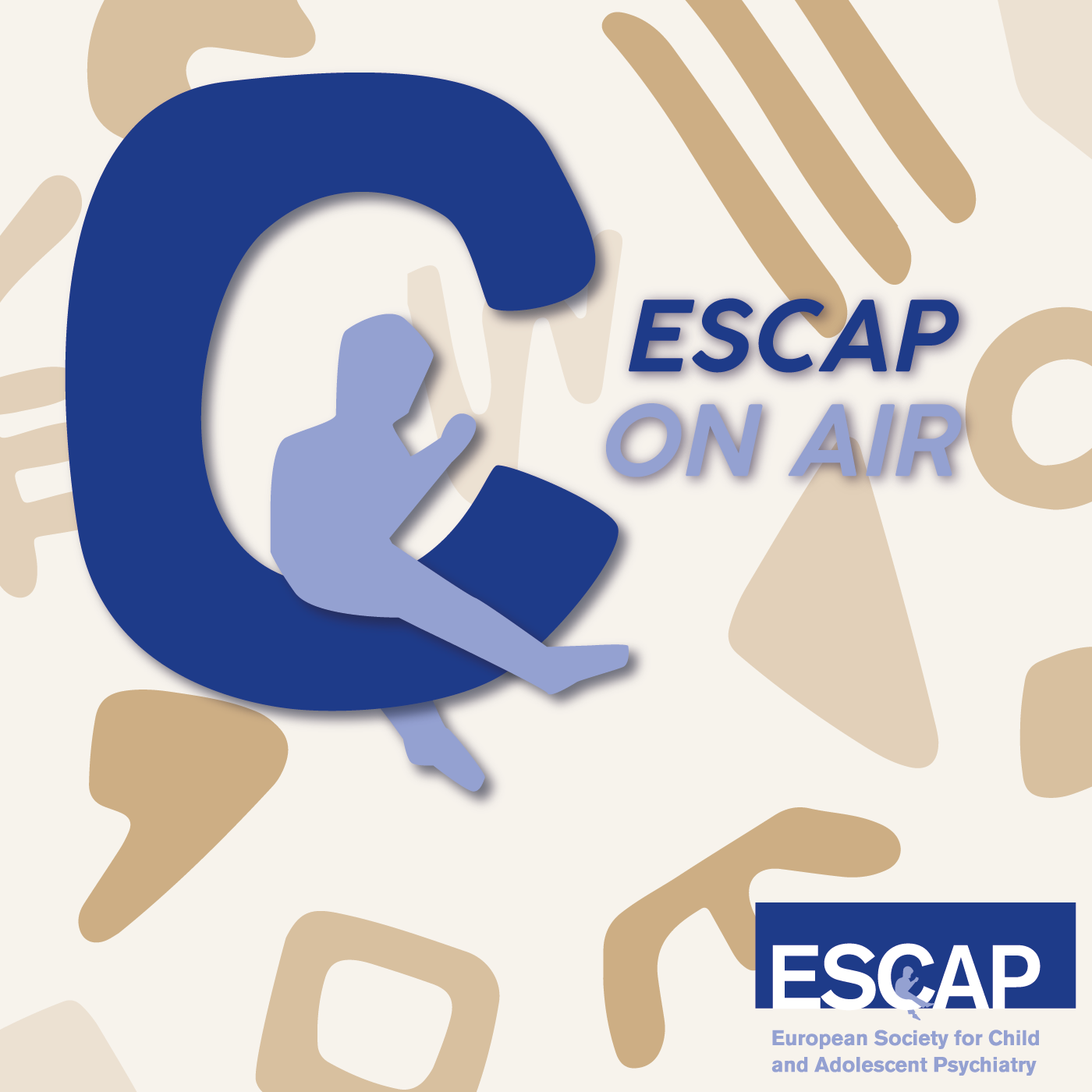
In the first episode in this new podcast from the European Society for Child and Adolescent Psychiatry, "ESCAP on air," the focus is on mental health at the population level, early interventions and collaboration in research with policy makers. We interview Tamsin Ford, Professor of Child and Adolescent Psychiatry at the University of Cambridge, and Anna Sofie Kjærgaard Hansen, a specialist and PhD at Aalborg University Hospital. Ford discusses her research on school-based interventions and the importance of involving policymakers, while Hansen shares her insights on service use in psychiatry. We recorded this conversation during ESCAP 2023 in Copenhagen.
The conversation is split into two chapters to make it easy for you to take a break halfway and pick it up again, when it suits you.
Listen below or follow us on Spotify or Apple Podcasts.
Chapter 1:
Chapter 2:
“Youth mental health entering dangerous phase, as experts warn of megatrends affecting young people”
Youth mental health has been declining over the past two decades and is entering a dangerous phase, suggests a new Lancet Psychiatry Commission. Several global megatrends are implicated, including inaction on climate change, intergenerational inequality, and adversity linked to the COVID-19 pandemic. The roles of socioeconomic and technological megatrends, among other risk factors, should be analysed, and their harmful effects addressed.
The Forensic Psychiatry Working Group (FWG) was proposed during EFPT forum 2024 in Riga (Latvia) and approved by the General Assembly in the same year. The initial idea was to address the intersection of the diverse legal systems of Europe and mental health, aiming to gather psychiatric trainees, providing a platform to discuss how psychiatric principles and practices apply within the diverse legal context of Europe as well as topics like criminal responsibility, competency to stand trial and civil commitment.
The FWG is open to all psychiatric trainees who are interested in forensic psychiatry. For further information, please contact the working group: forensic-psychiatry-wg@efpt.eu
Chair: Dr Farshid Monshizadeh Tehrani and Co-Chair: Dr Beyza Akan
For more information, visit the EFPT website.
Earlier this month, the WHO Office on Quality of Care and Patient Safety in Athens, in collaboration with WHO European Mental Health Flagship, launched for consultation its new quality standards to improve the quality of child and adolescent mental health care. The standards were developed in collaboration with the Pan-European Mental Health Coalition and with support from the Government of Greece. The standards, based on literature and perspectives from young people, parents and carers, and providers, set out a vision of what good-quality care for child and adolescent mental health looks like. The overall goal is to provide evidence-based content co-created with stakeholders, and set ambitious yet achievable performance benchmarks that are feasible to implement and can be linked to other WHO resources and tools.
WHO Europe is particularly interested to hear feedback from children, young people and parents/carers, as well as those providing child and adolescent mental health care. However, anyone is welcome to review the quality standards and provide feedback. The consultation closes on 10 September 2024.
For more details, visit the WHO Europe website.
This new resource presents a comprehensive framework designed to enhance and streamline telemedicine services within health-care systems. It addresses the critical need for accessible and effective telemedicine solutions, especially in the face of global health challenges and the evolving demands on health-care infrastructures. It outlines a multidimensional strategy that includes an assessment of the current health-care ecosystem, strategic visioning for telemedicine integration, organizational change management, development of telemedicine services, and continuous monitoring, evaluation, and optimization. It emphasizes the importance of considering the unique needs of diverse populations and ensuring equitable access to telemedicine technologies. By leveraging global best practices and empirical evidence, the document aims to guide stakeholders through the lifecycle of telemedicine service implementation—from conceptualization to maturity. Intended for health-care decision-makers, policy-makers, and telemedicine practitioners, the framework supports the development of high-quality telemedicine services at various levels of the health system. It facilitates a collaborative approach, encouraging alignment and coordination among different stakeholders to achieve a common goal: building a resilient, patient-centred, and technologically advanced health-care system.
Press release
WHO/Europe has launched the Strategic Partners’ Initiative for Data and Digital Health (SPI-DDH), a collaboration network that brings together the 53 Member States of the WHO European Region and leading partners in the fields of data and digital health.
The SPI-DDH aims to tackle issues related to the digital transformation of health systems and foster a future where all patients and health-care workers can benefit from safe, affordable and person-centred digital technologies for health.
The Commission has released the 2024 edition of the Science, Research and Innovation Performance (SRIP) report. This new edition offers a comprehensive and detailed overview of how Europe is performing today in terms of science, research and innovation and analyses the key determinants of this performance. By highlighting the essential role of R&I in driving competitiveness, environmental sustainability and improved quality of life, the report offers data-rich analysis coupled with in-depth exploration of topical policy issues.
The WHO Office on Quality of Care and Patient Safety in Athens, Greece, through its Programme on the Quality of Child and Adolescent Mental Health Care, in collaboration with the WHO European Mental Health Flagship, introduces the first-ever WHO Young Researchers Forum to improve the quality of child and adolescent mental health care, set to be launched on 4 June 2024.
This initiative, tailored for early-career professionals and researchers from the WHO European Region, aims at improving the quality of children and adolescents' mental health care through supporting cutting-edge research and cross-disciplinary partnerships.
The Forum is specifically designed for early-career researchers and professionals aged 18–30 years in the WHO European Region, who are passionate about addressing the quality of mental health services for children and adolescents. This demographic includes students, recent graduates, postdoctoral researchers, and young professionals in the early stages of their careers in fields relevant to mental health, such as psychology, psychiatry, public health, social work, and education.
The EU Commission launched a tracking framework which provides regular updates on the implementation of the actions stemming from the Communication on a comprehensive approach on mental health adopted on 7 June 2023.
This version was published on 13 May 2024 on the occasion of the European Mental Health Week and the next update is scheduled for the World Mental Health Day, 10 October 2024.
After the positive feedback received in relation to the previous edition, the third Residential Course on Child and Adolescent Psychiatry endorsed by ESCAP took place from September 27th to 30th, 2023 in Catania, Italy. The Residential Course is organized on a yearly basis with the contribution of “Progetto Aita” Onlus, a non-profit association which supports children with neurodevelopmental disabilities by promoting inclusive social and sport activities, as well as scientific events in the field of child and adolescent mental health.
Read the report in our ECAP journal.
Find out more about this year's Residential Course and how to apply.
In 2023, our planet witnessed record-breaking temperatures, with last year's average temperature surpassing the pre-industrial average by 1.4 °C [1] Approaching the critical 1.5 °C threshold of long-term warming, is expected to bring severe impacts. These impacts are projected to affect various aspects of everyday life, though predicting the exact magnitude of their effects remains challenging. Greece, grappling many years with recurring wildfires, endured this summer a major wildfire, which burned continuously for twenty days in the northern part of the country, followed by extreme floods triggered by a cyclone that struck the Mediterranean region. Europe, too, experienced unprecedented heatwaves beyond the summer months.
The newly released Council of Europe Guide to children’s participation in decisions about their health aims to provide answers and food for thought and further pursues its efforts to promote a child-friendly, participatory approach to care and research.
The Guide provides information and advice, primarily for healthcare professionals, about how to involve children in decision-making processes regarding their health. It starts by presenting the theoretical and legal framework for children’s participation in the field of healthcare and progresses to describe important components of the decision-making process, helping health professionals to understand their role in supporting children, families, and other professionals to enact this in practice.
Key concepts of consent, assent, and best interests are discussed, and common healthcare situations are presented where participation in decision making may sometimes be perceived as more challenging. Examples and links to good practice are provided throughout.
The Guide was developed by the Steering Committee for Human Rights in the fields of Biomedicine and Health (CDBIO) and the Steering Committee for the Rights of the Child (CDENF), and is available in English and French.
ESCAP firmly believes that there is an urgent need to apply widely endorsed clinical, scientific, and ethical standards to the care of children and adolescents with gender dysphoria. It is important to base decisions for possible medical transitions on a rigorous assessment of individual needs and their capacity to consent regarding the serious long-term consequences of these treatments.
ESCAP strongly supports and welcomes the EU mental health initiatives by the EU Commission, Council and Parliament regarding. It is time and finally a chance to make a difference for the benefit of young people’s mental health in the European region!
Read our latest ESCAP Communication here.
See also ESCAP's mental health positions ahead of this year's European Parliament elections.
In December 2023, the EU launched their first Union list of critical medicines. The list contains medications whose continued supply is deemed a priority in the European Union, with an aim to prevent harm to patients and ensure the smooth functioning of healthcare systems function. Given the high level of impairment associated with untreated ADHD, and the fact that, in many countries, methylphenidate is the only available compound to treat ADHD, we were surprised that the list does not include methylphenidate.
The Commission adopted the Recommendation on developing and strengthening integrated child protection systems in the best interests of the child, as a commitment in the EU Strategy on the Rights of the Child.
The Recommendation will support Member States in strengthening their child protection systems. Authorities at all levels of governance and civil society across all sectors need to work together to protect children from all forms of violence in a coherent and systemic way.
In October 2023, ESCAP contributed to the EU consultation on integrated child protection systems. Read our statement here.
Download Recommendations (available in English, German, French)
The FAMILY consortium has published an article in our ECAP journal: "Running in the FAMILY: understanding and predicting the intergenerational transmission of mental illness". Find out more about the Horizon Europe project and its objectives. ESCAP is delighted to be a partner in this important project and we would like to thank all consortium members for the fruitful collaboration.
The EU have launched their updated and enhanced Funding and Tender Portal. It features advanced search capabilities, tailored recommendations and enhanced filtering. You can watch a short video explaining the changes.
The Health Behaviour in School-aged Children (HBSC) study is a large school-based survey carried out every four years in collaboration with the WHO Regional Office for Europe. The 2021/2022 HBSC survey data are accompanied by a series of volumes that summarize the key findings around specific health topics. This report, Volume 2 in the series, focuses on adolescent peer violence and bullying, using the unique HBSC evidence on adolescents aged 11, 13 and 15 years across 44 countries and regions in Europe, central Asia and Canada. It describes the status of adolescent peer violence (bullying, cyberbullying and fighting), the role of gender, age and social inequality, and how adolescent bullying and fighting behaviour has changed over time.
With view to the 2024 elections for the European Parliament, the ESCAP Board agreed recommendations and demands with regard to ensuring that the mental health of children and young people are being treated as a priority throughout the next legislative period 2024-2029.
During 2023, the EU Commission, EU Council and EU Parliament have all released initiatives and statements addressing the mental health crisis we are experiencing. We welcome all participatory initiatives and now need to see concrete actions. During the next legislature period, we expect the new EU Parliament to expand and implement the important fundamental resolution from 2023. Addressing the Mental Health crisis is a continuous task that needs to be taken seriously and must not be dropped in the light of other developments.
ESCAP’s Positions – European Parliament Elections 2024 (English)
Positions de l’ESCAP – Elections du Parlement européen 2024 (Français)
ESCAP’s Positionen – Wahlen zum Europäischen Parlament 2024 (Deutsch)
Posiciones de ESCAP – Elecciones al Parlamento Europeo 2024 (Español)
Children's lives are increasingly blended between the digital and physical worlds, intertwining virtual and real experiences in their daily routines. Ensuring online safety for children is becoming a growing concern within the WHO European Region.
Most children grow up with digital devices that give them constant access to the Internet. While this may bring benefits and open up possibilities, it can also allow significant harms for children’s development and physical and mental health.
This conference edition of the WHO Regional Office for Europe’s Position Statement on Making the WHO European Region the Healthiest Online Environment for Children aims to support governments in formulating consistent requests to online and technology companies, with the overall goal of securing healthy online environments in which children can thrive. The position paper addresses the need to protect all children up to the age of 18 from violence, exploitation and abuse; highlights the need to include children’s rights in all actions; and addresses privacy and data protection issues.
The EU4Health Civil Society Alliance, gathering more than 30 health civil society organisations, has defined its priorities and recommendations ahead of the upcoming European elections in 2024, with the overarching goal of securing health on the EU political agenda. The manifesto gathers 10 key priorities, focusing on strengthening EU policymaking in public health, delivering stronger policies improving public health, and breaking policy silos:
The clinical management of Child sexual abuse (CSA) demands specialised skills from healthcare professionals due to its sensitivity, legal implications, and serious physical health and mental health effects. Standardised, comprehensive clinical practice guidelines (CPGs) may be pivotal. In this systematic review published in The Lancet Regional Health Europe by Otterman et al, existing CSA national CPGs (NCPGs) from European countries were examined to assess their quality and reporting.
ESCAP strongly supports the authors' call for the development of a pan-European guideline.
The EU is one of the most equal and prosperous regions in the world. Yet, the rights of far too many children within its borders are under threat or even denied. Too many children in the EU face persistently high rates of poverty and social exclusion, mental health challenges, and environmental dangers such as air pollution.
UNICEF's new report The state of children in the European Union summarizes analyses by UNICEF on child well-being and progress for children in the European Union (EU) during the period of the current EU legislature, 2019-2024, identifies key issues for the next political cycle and makes recommendations on how to address those.
The report is accompanied by four policy briefs covering child poverty, mental health, the environment and digital technologies.
This Scoping Review by Gossmann et al was conducted following the terrorist attacks on Israel in October 2023 and is now available online in our ECAP journal.
The ESCAP Board released two statements and we are reiterating the call for a humanitarian ceasefire.
Statement of the ESCAP Board on children taken as hostages in the context of the recent terrorist attacks in Israel
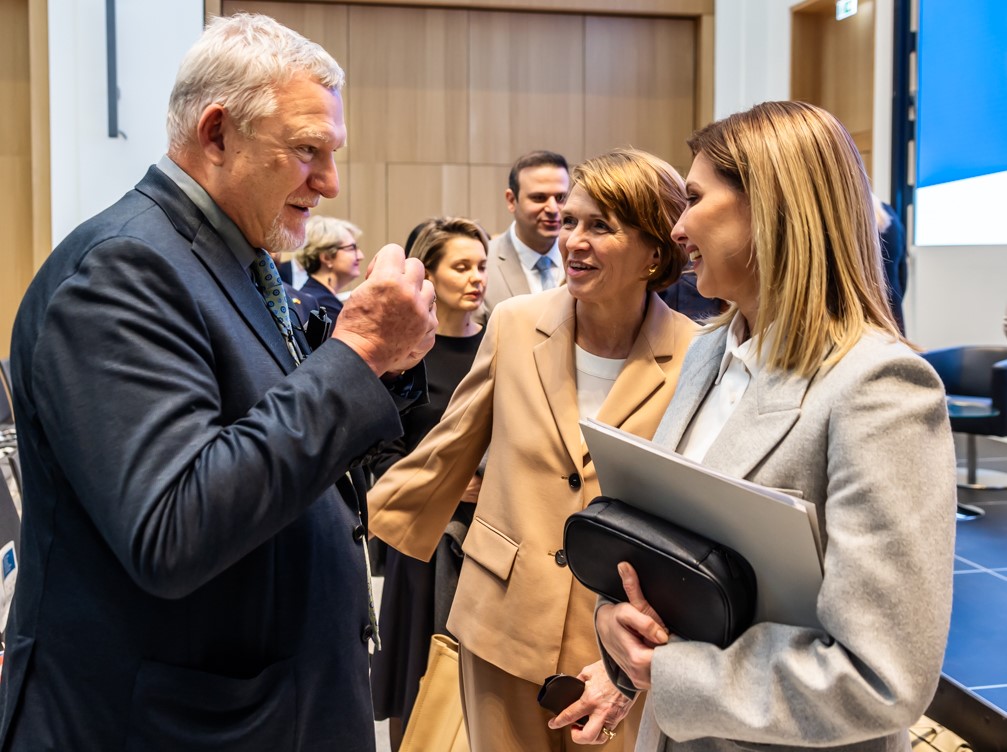
A medical conference to support mental health, psychosocial support and rehabilitation in Ukraine took place in Berlin on 1 and 2 February 2024. The conference was held under the patronage of the two First Ladies Olena Zelenska and Elke Büdenbender and focussed on trauma care and the prevention of long-term consequences. The spectrum ranged from acute trauma surgery care and medical support by taking over patients with oncological diseases that can no longer be treated in Ukraine, especially in the paediatric and adolescent sector, to traumatic war injuries that cannot be treated or are difficult to treat given the destruction of hospitals by air raids.
Professor Jörg M. Fegert had been invited to speak in both his capacity as head of the Department of Child and Adolescent Psychiatry/Psychotherapy at the University Ulm and ESCAP President.
Read his conference report here.
For further information and photos
Further formalizing our links with WHO Europe, ESCAP officially joined the pan-European Mental Health Coalition this month where we will be represented by the Co-Chairs of our Policy Division, Maja Drobnič Radobuljac and Robert Vermeiren.
The Coalition is a partnership dedicated to improving mental health across the WHO European Region. It targets gaps in mental health services by gathering national leaders, professionals, members of civil society, representatives of international organizations and experts to collaborate on bringing mental health out of the shadows and into the mainstream.
Key priorities for the Coalition are to transform mental health services and integrate mental health into emergency response and recovery efforts, as well as promoting mental health and preventing mental ill health across the life course.
The 1st FAMILY Stakeholder Dialogue Event took place on January 17th, 2024 and 42 participants from across Europe attended the online event. The main objective was to collect the views of mental healthcare professionals on the ethical aspects and social consequences of prediction of risk of severe mental illness. Risk prediction for mental health problems is a prominent focus of research in psychiatry. However, risk prediction comes with ethical and social challenges, such as questions about informed consent, the right not to know, risk of stigmatisation and discrimination, empowerment and strengthening resilience of affected families, responsible use of Artificial Intelligence etc. In break out groups case studies were discussed and the results shared in the plenum.
Read more in our post-event report.
The midterm revision of the EU Multiannual Financial Framework for 2021-2027 was agreed by the EU Council. To finance the priorities identified, cuts were made in a number of areas, including EUR 2,1 billion being redeployed from Horizon Europe and EUR 1 billion will be redeployed from the EU4Health programme.
Prospects for Children in 2024: Cooperation in a Fragmented World is the latest edition of the Global Outlook, a series of reports produced each year by UNICEF Innocenti – Global Office of Research and Foresight, which look to the key trends affecting children and young people over the following 12 months and beyond.
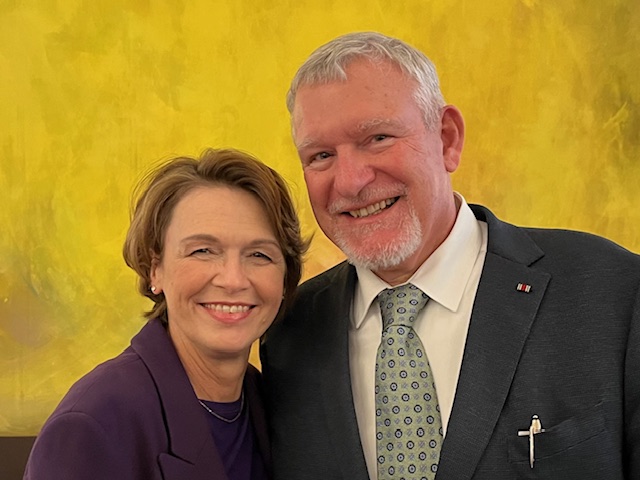 On 12 January ESCAP President Jörg Fegert attended the New Year's Reception of Germany's First Lady Ms. Büdenbender at Bellevue Castle in Berlin. In her speech, Ms. Büdenbender highlighted the importance of mental health, especially of young people.
On 12 January ESCAP President Jörg Fegert attended the New Year's Reception of Germany's First Lady Ms. Büdenbender at Bellevue Castle in Berlin. In her speech, Ms. Büdenbender highlighted the importance of mental health, especially of young people.
You can read the full speech (in English) here.
The new WHO Europe report summarizes findings from the Health Behaviour in School-aged Children (HBSC) survey round 2021/2022 regarding the unequal impact of the COVID-19 pandemic on adolescents’ health and health behaviours in 22 countries and regions of the WHO European Region.
The survey showes that the pandemic and imposed restrictions had an unequal impact on adolescents, being more negative for those who were vulnerable to health problems and thereby further increasing pre-existing inequalities.
Based on the findings, the report includes recommendations on the implications these should have for policy-making going forward. Understanding the COVID-19 impact on more disadvantaged groups is essential to avoid increases in the social gradient in health.
The European Commission published the first Union list of critical medicines, together with the European Medicines Agency (EMA) and the Member States' Heads of Medicines Agencies (HMA). The publication follows the commitment made in the Commission's Communication on addressing medicine shortages in the EU to accelerate the work on this list, originally announced in the EU's pharmaceutical reform proposal. It is an important part of the EU's efforts under the European Health Union to ensure patients have the medicines they need, by fostering the security of supply of critical medicines and preventing shortages from occurring. It is also part of the EU's efforts to improve its resilience and strategic autonomy in the face of geopolitical and unexpected challenges.
A medicine is listed as critical when it is essential to ensure the provision and the continuity of quality healthcare, and to guarantee a high level of public health protection in Europe. This first Union critical medicines list contains more than 200 active substances used in human medicines, which are considered essential in the EU/EEA.
The inclusion on this list is not an indication that a medicine is likely to experience a shortage in the near future. Rather, it signifies the critical importance of averting shortages for these specific medicines, as its unavailability could cause significant harm to patients and pose substantial challenges to health systems.
MEPs adopted their recommendations on prioritising mental health, as an integral part of a person’s health, in EU and national policies. MEPs call on the Commission to draw up a long-term, comprehensive and integrated EU Mental Health Strategy. Member states should develop corresponding national strategies with clear timelines, adequate budgets, concrete targets and indicators to monitor progress.
As the ongoing humanitarian crisis in the Gaza Strip now threatens epidemics according to the WHO and basic living and health needs can no longer be guaranteed, the foundation is missing. Not only for the survival of children and young people who were born victims of a conflict in this region, but also for their educational opportunities and mental health, which are massively jeopardized in the long term by potentially traumatizing conditions. This is how a new round of the cycle of violence is created. We fully support the WHO’s call for the protection of humanitarian space in Gaza issued on Tuesday (12/12/2023).
We believe it is important to unambiguously make it clear that the current humanitarian crisis will have long-term consequences for individual development. Basic needs must be guaranteed immediately! We call for immediate and long-term psychological support for children and families in the area and for a durable political solution with peace for children, no matter what nationality their parents are.
The EU Council highlights the importance of addressing mental health and well-being in different contexts in the life course, which benefits both individuals and societies. It recognises the beneficial role of communities, schools, sports and culture in strengthening mental health and life-long mental well-being.
The conclusions invite member states to elaborate actions plans or strategies with a cross-sectoral approach to mental health, addressing not only health, but also employment, education, digitalisation and AI, culture, environment and climate factors, among other things.
ESCAP invites all member societies to approach their national governments with view to implementing these conclusions and highlighting the importance of considering the mental health of children and adolescents in particular.
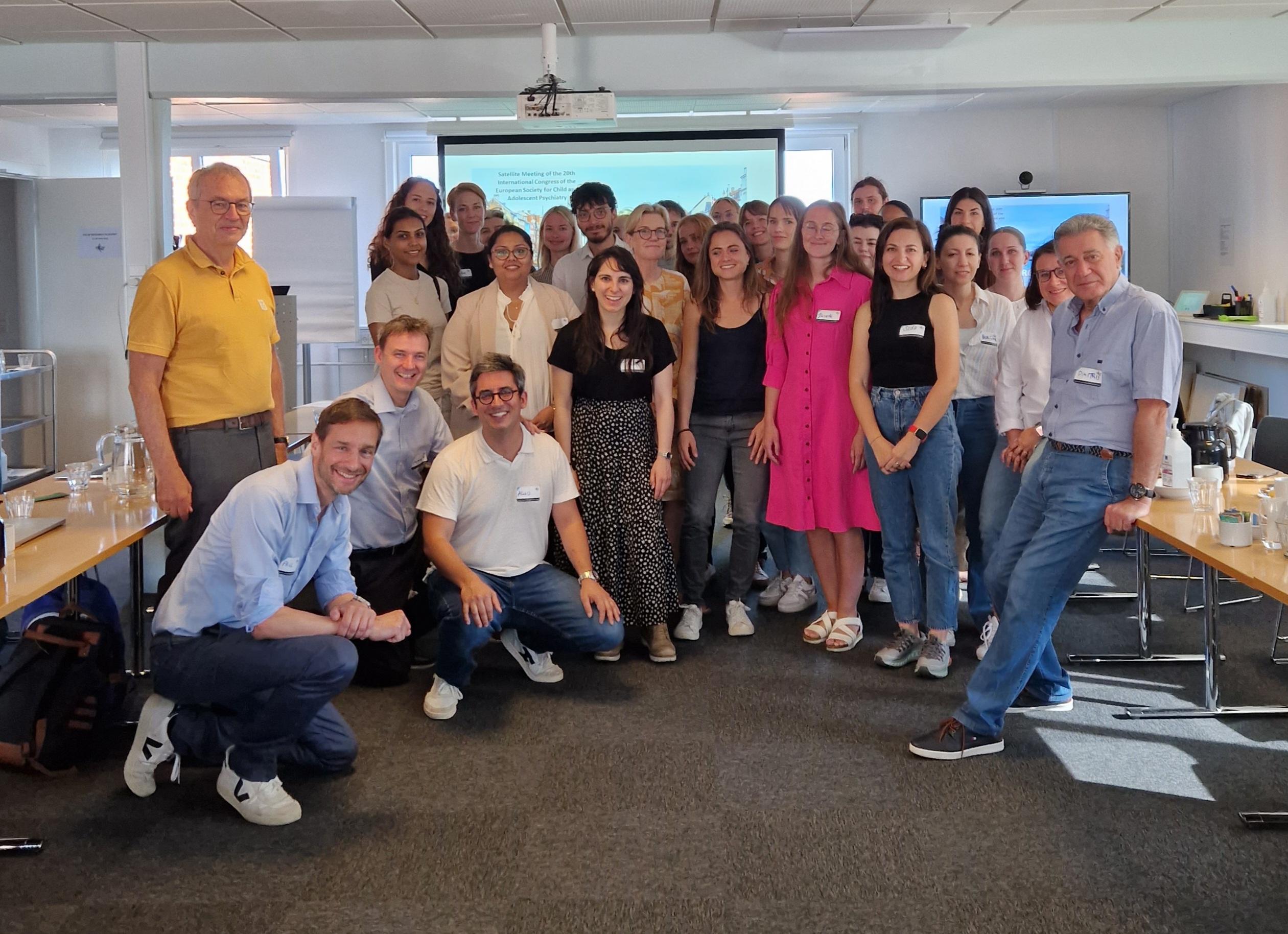
The 6th workshop of the ESCAP Research Academy (RA) took place from June 27th to 28th, 2023 in Copenhagen, just prior to the ESCAP Congress. 25 fellows from 14 ESCAP member countries (Belgium, Cyprus, Denmark, France, Germany, Hungary, Lithuania, Norway, Serbia, Spain, Sweden, Switzerland, Turkey, and the UK) were selected to take part. In addition, we were delighted to welcome a participant from India this year.
A review of the workshop has now been published as an ESCAP Communication in our ECAP journal.
This framework was developed to answer a strong and consistent request from WHO pan-European Coalition members that young people be actively engaged in activities undertaken by WHO which impact young people’s mental health and well-being across the European Region, whether it be policy or guidance development, research or programming. Young Coalition members initiated development of the framework to ensure that the active participation of young people was carried out in a way that was consistent, meaningful and, most importantly, underpinned by what young people want and need to feel safe and empowered to engage.
ESCAP is shocked and deeply saddened by the recent terrorist attacks in Israel and the escalating violence and horrors in Israel and Gaza that ensued and are still on-going. Our thoughts and sympathy are with the victims and everyone affected by these horrific events.
In our positional statements "War hits children first" and "The impact of war" we highlighted that it is always children who are hit first and trauma research shows the devastating consequences and what our profession can contribute to support and treat these children.
We call for the immediate release of the children taken hostage and the provision of care for them in the aftermath of their ordeal. Caregivers taken as hostages with their children and siblings should be freed together with them, as they play an important role in the direct support of their children.
We fully support UNICEF's statement from 24 October 2023 and their call for ceasefires and for sustained and unimpeded access for humanitarian assistance.
The EU Commission is working on an initiative that aims to support the development and strengthening of integrated child protection systems in the EU.
Focused on children’s needs, the initiative aims to encourage all relevant authorities and services to work together in a holistic way, from preventing abuse of and violence towards children, to protecting them. It is also intended to present how to better use existing EU tools (laws, policies, funding) to make child protection systems more integrated and robust, by avoiding silos.
As part of the initiative, they ran a public "Have your say" consultation to which ESCAP provided feedback. Read our response here.
You can read more about the initiative and all submitted responses on the "Have your say" website of the EU Commission.
Yesterday, a new Eurobarometer on mental health was published which shows that nine in ten respondents (89%) consider that mental health promotion is as important as physical health promotion. At the same time, less than half of respondents agree that people with mental health issues receive the same level of care as those with a physical condition. Moreover, almost half of respondents (46%) experienced an emotional or psychosocial problem, such as feeling depressed or anxious, in the past twelve months. More than half of these respondents (54%) with a mental health issue have not received help from a professional, according to the survey.
The Flash Eurobarometer was conducted between 14 June 2023 and 21 June 2023. A total of 26,501 respondents aged 15 and over from 27 EU Member States were interviewed via computer-assisted web interviewing.
WHO-OHCHR launch new guidance to improve laws addressing human rights abuses in mental health care
Ahead of tomorrow's World Mental Health Day, the World Health Organization (WHO) and the Office of the High Commissioner on Human Rights (OHCHR) have jointly launched a new guidance, entitled “Mental health, human rights and legislation: guidance and practice”, to support countries to reform legislation in order to end human rights abuses and increase access to quality mental health care.
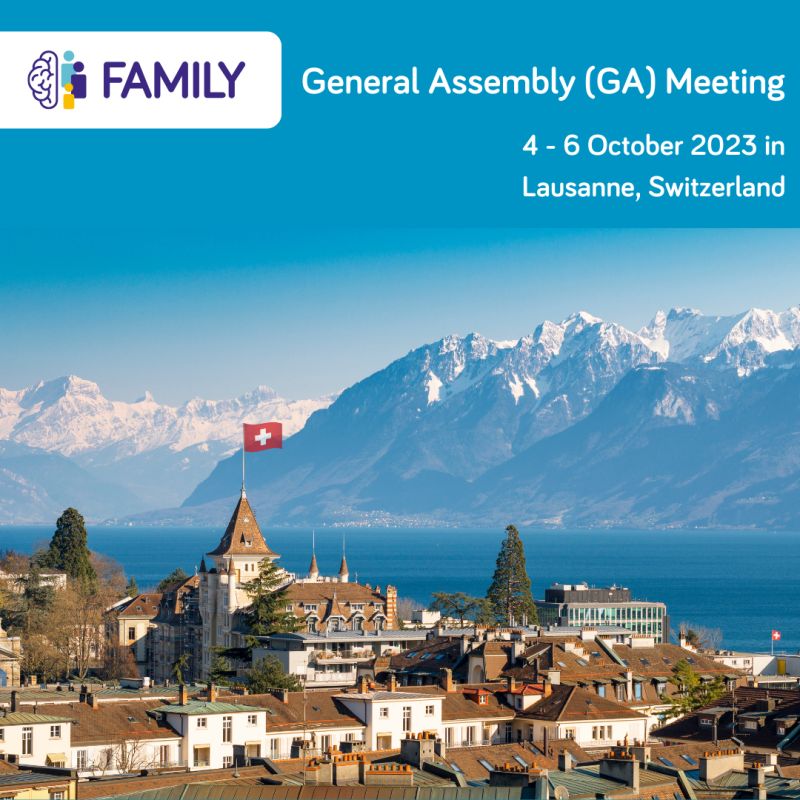
The General Assembly of the EU Horizon FAMILY project took place in Lausanne, Switzerland. This 5 year project "Running in the FAMILY – Understanding and predicting the intergenerational transmission of mental illness" started a year ago and it was great to meet with all project partners and find out about the progess in the different work packages.
Follow the project on X and LinkedIn and/or visit the project website for updates.
A new, free online course "A life with ADHD" from the University of Geneva and including international experts Samuele Cortese, David Coghill and Tobias Banaschewski can now be accessed on YouTube and Coursera. The course was developed for people affected by attention deficit disorder, their families, and the professionals who care for them. It is available in English and French.
More information - as well as other resources on ADHD and other disorders - can be found in our Resource Centre on the ESCAP website.
Methylphenidate for ADHD is not on the WHO Model List of Essential Medicines. A correspondence arguing that it should be has been published in The Lancet Psychiatry. Together with 15 other national/international associations, ESCAP endorsed this correspondence.
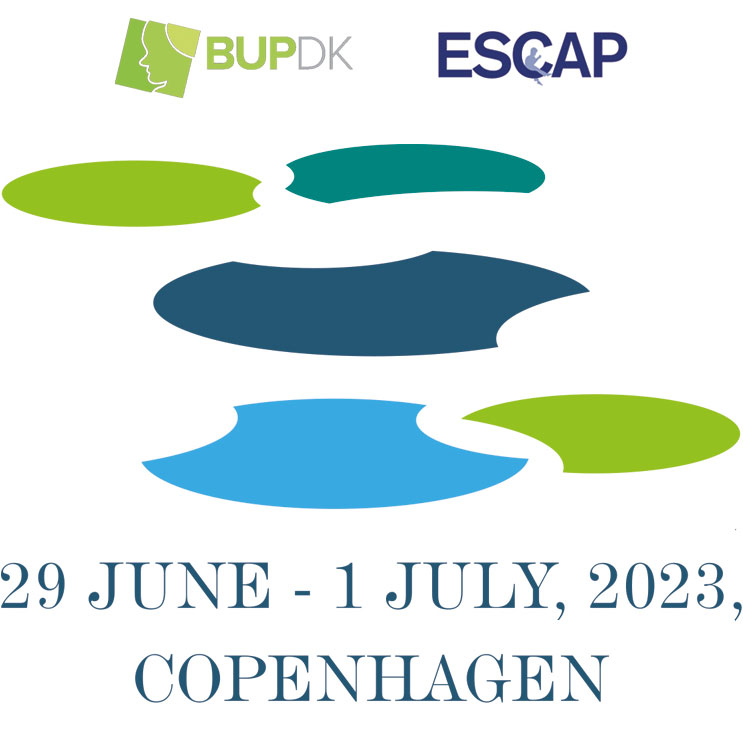
More than 1,600 delegates from all over the world attended the 20th International ESCAP Congress and enjoyed an outstanding scientific programme and the personal exchange and networks with colleagues.
On our YouTube Channel, you can watch interviews with some of our Keynote and State of the Art lectures as well as the Opening and Closing Ceremony of the Congress.
Review of the congress including photos and our poster prize winners.
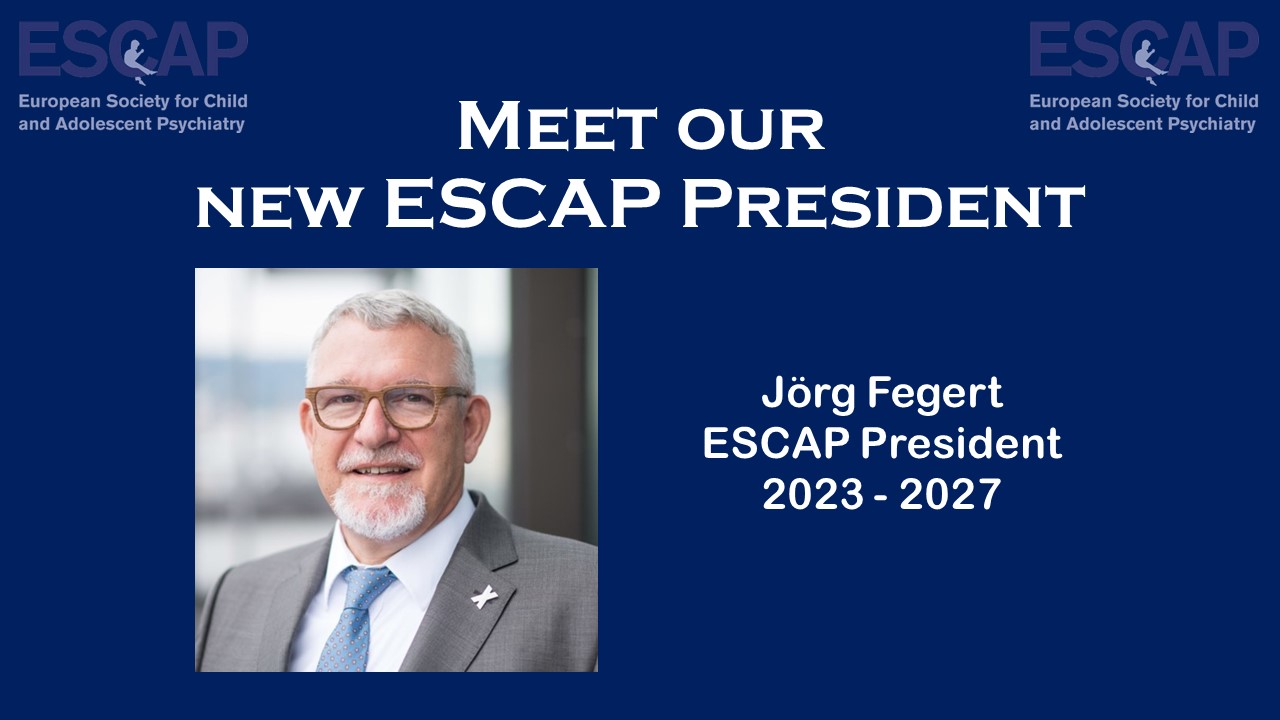
Jörg Fegert started his term as ESCAP President. Jörg joined the Board in 2019. Before taking on the role of President, he chaired the ESCAP Policy Division.
Jörg is based in Ulm, Germany and his personal field of interest is care of traumatized children and child protection issues in medicine and in an interdisciplinary background.
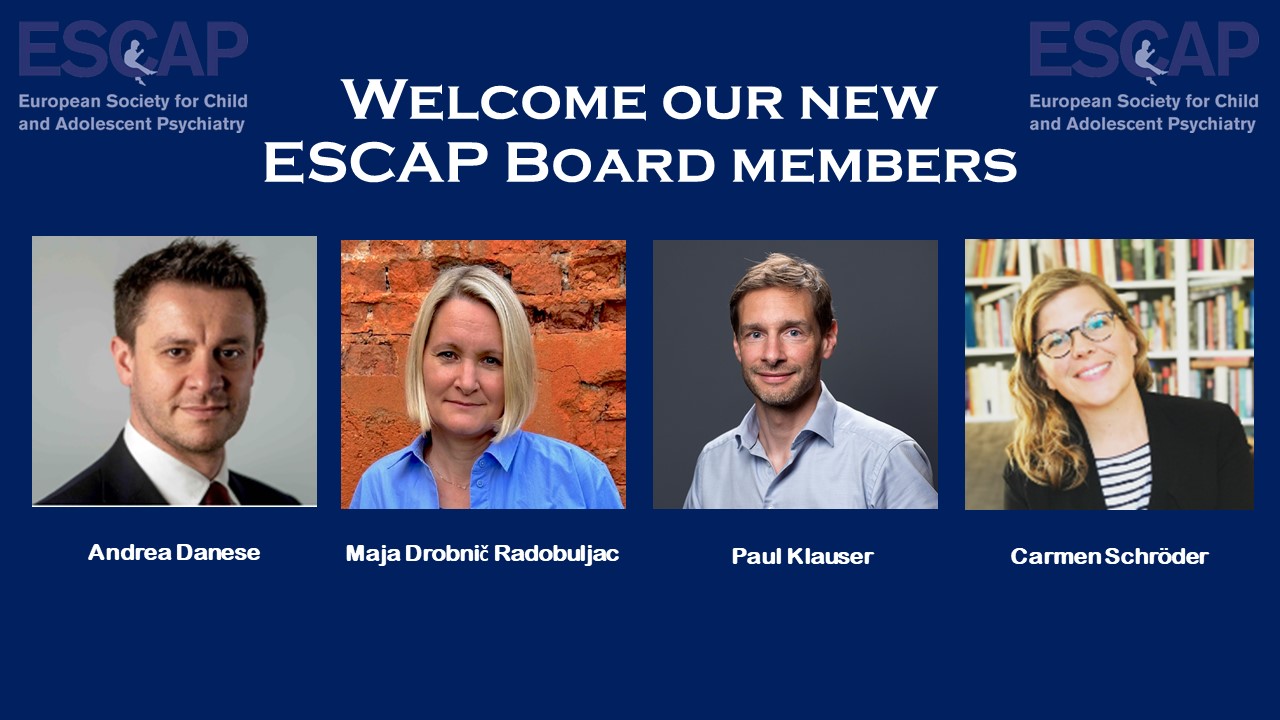
We warmly welcome our new Board members:
Over the last years, Child and Adolescent Psychiatry services are confronted with a growing number of children and adolescents with severe and enduring mental health problems. Unfortunately, state of the art psychotherapeutic and pharmacological interventions are insufficient to help them. Subsequently, a number of youths lose perspective and feel abandoned by society and do not believe that they can be helped. Therefore, innovative ways of providing care must be explored.
In that perspective, we need to explore the possibilities of the growing body of youth peer support workers (YPSWs) in child and adolescent psychiatry (CAP).
The EU HPP (Health Policy Platform) Mental Health in all Policies (MHiaP) Thematic Network have released a statement on "A Mental health in All Policies approach as key component of any comprehensive initiative on mental health". The statement is calling for a Mental Health in All Policies (MHiaP) approach, i.e., for public policies across sectors to promote population mental health and wellbeing by initiating and facilitating action within different non-health public policy areas. The vision is that of a Europe where everyone’s mental health can flourish across the entire life course and everyone can have timely, appropriate and affordable access to support, when needed. ESCAP officially and fully endorses this statement.
Last week’s earthquake in southern and central Turkey and northern and western Syria shocked the world. The number of lost lives and those injured still continues to rise. Our sincere sympathy and solidarity go out to everyone affected and we offer our condolences to the bereaved families and the injured.
Following the disaster, we have seen National, European, International NGOs as well as communities and individuals coming together to provide financial help and support on the ground. We are grateful for all these valuable efforts which also contribute to enabling returning to a certain degree of normalcy. As the first rescue teams are now pulling out, we want to stress how important it is to offer long-term support in these situations.
While the initial focus of the rescue has been on physically assisting the victims, the psychological consequences of such tragedies are immense and must not be ignored. Not least, as we are seeing a rise in natural disasters across Europe, it’s necessary that we develop processes to address these issues and offer immediate psychological support, especially to children and adolescents.